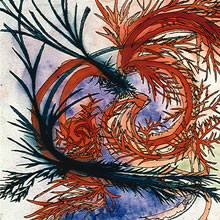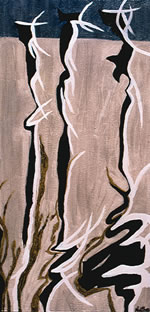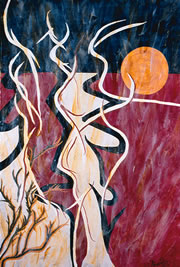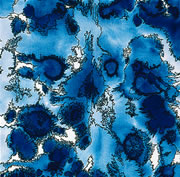Artist of the Month - May 2007 North by Southwest |
||||
Nature appears
random and chaotic but the trained eye can perceive the
beautiful, steady patterns that lie beneath. Theories
exist to explain these intriguing structures, spawning
films like A Beautiful Mind and Pi that boil down Nature’s
tendencies into formulas. For the majority of us who
are not science wizards, we have to trust our eyes to
see these mystical patterns.
The extreme landscapes of this area influence the emotional connections she depicts in her abstract paintings, such as in the mixed media works entitled, “Ice Blossoms of Mill Creek Canyon” and “Above and Beyond Park Avenue.” The titles give easy clues as to where North drew her inspiration for these watercolor, ink and graphite paintings. The contours
outlined in ink of these works look familiar. The crystalline
swirls in “Ice
Blossoms” and in “Ice Fractures in Willow Flats
Wash” resemble the patterns found in ice. North displays
her propensity for poetry, both visual and literate, in the
apt titles she gives these paintings, describing these fissures
as “blossoms” and “fractures”, imparting
both the softness and harshness found in nature.
In paintings
like “Can You See
It In Your Eyes...In Your Soul?” and “Can You
Turn It On Internally”, the titles immediately reveal
an interplay of ideas that the artist explored through these
abstracts. The jagged lines flowing in various directions
resemble loosely the fractures in the paintings inspired
by nature, but the inherent pattern that emerges in those
is not present in these conceptual paintings.
Having grown
up around artists, several family members are, including
her grandmother, North experimented with many media, such
as ceramics, architectural design and modern dance. Through
her in-depth knowledge of art materials, she landed a job
working at Meininger’s Art Supply
Store in Denver, Colorado, where she met Jonathan. Although
the two share a studio and even collaborate on occasion,
they create vastly different interpretations of the same
natural world. North Frank’s paintings can be contacted through the Jonathan Frank Studio (tel. 435-719-2042) or www.jonathanfrankstudio.com. She also participates in the annual Moab Abstracts show (held in February), for which her painting “Big Sky: Mercy” graced the cover of this publication. |



